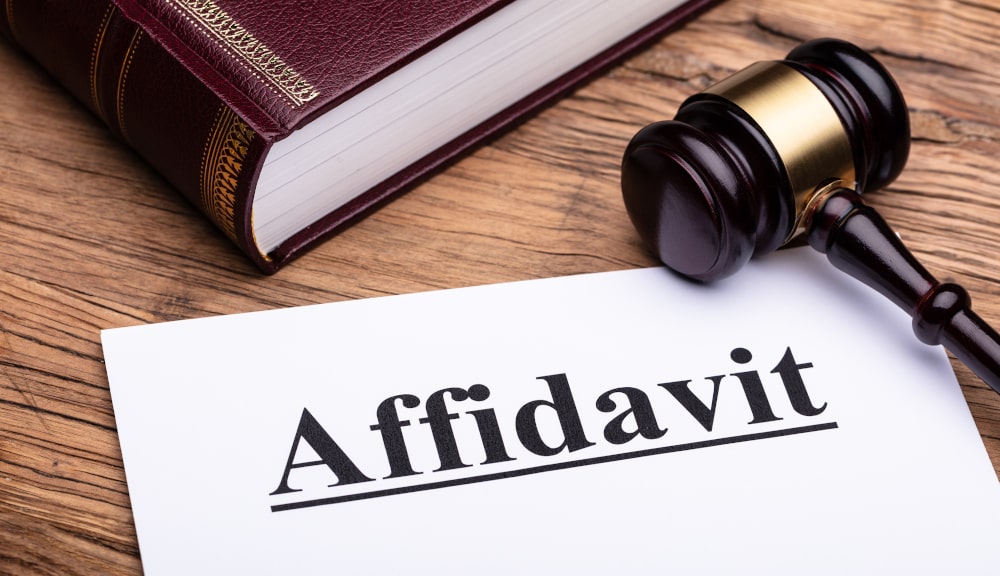
Key Takeaways
- An affidavit can be an effective tool in persuading the Crown to drop charges, especially in domestic assault cases.
- Only the complainant can submit this affidavit; the accused and their lawyer cannot be directly involved in the process.
- The affidavit must be truthful and legally sound; otherwise, it may result in criminal charges, such as perjury or public mischief.
- Working with a criminal defence lawyer ensures the affidavit is crafted carefully and within the bounds of Canadian law.
- Timing matters — submitting the affidavit early may improve the chances of charges being dropped.
Table of Contents
- What Is the Legal Process for Dropping Criminal Charges in Canada?
- What Is an Affidavit?
- When Is an Affidavit Used to Drop Criminal Charges?
- Why Victims Might Want to Drop Charges
- Is There Such a Thing as an “Affidavit of Non-Prosecution”?
- Who Can Submit an Affidavit?
- How to Prepare an Affidavit to Drop Charges
- Why Legal Help Matters
- How to Submit an Affidavit to the Crown in Toronto
- What Happens After Submission?
- Work with a Criminal Defence Lawyer to Draft Your Affidavit
What Is the Legal Process for Dropping Criminal Charges in Canada?
The words “dropped charges” are often a source of relief for anyone accused of a crime in Canada. But how can this happen?
While the defence lawyer can request a withdrawal during pre-trial discussions, the Crown will usually proceed unless:
- The evidence is weak,
- There’s limited public interest in prosecuting, or
- The complainant (victim) takes formal steps, like submitting an affidavit.
Of all available tools, an affidavit from the complainant is often the most effective. A verbal request alone typically carries less legal weight. A signed affidavit becomes part of the case record and may significantly influence the Crown’s decision.
It’s essential to note that the accused and their lawyer cannot assist in or draft this affidavit. The process must be initiated solely by the complainant.
“An affidavit is a powerful legal instrument, but it must be used with caution and legal guidance. A poorly written affidavit can do more harm than good.”
— Joel Prajs, Criminal Defence Lawyer at Vilkhov Law
What Is an Affidavit?
An affidavit is a sworn, written statement of facts made voluntarily by a person (the “affiant”) and signed in front of a commissioner for oaths, lawyer, or notary public. It becomes part of the legal record and can be used as evidence in court proceedings.
Key facts about affidavits
-
Legally Binding Like Court Testimony
An affidavit carries the same legal weight as in-court testimony. Making a false statement in an affidavit can result in criminal charges such as perjury under Section 131 of the Criminal Code of Canada. -
Must Be Based on First-Hand Knowledge
Affidavits should only include facts that the affiant personally knows to be true. Hearsay, opinions, or assumptions are not permitted. -
Requires Proper Witnessing and Certification
The document must be signed in the presence of an authorized individual, such as a lawyer, notary public, commissioner for oaths, or designated court staff. -
Used in Various Legal Contexts
Affidavits are not limited to criminal cases. They are also used in civil lawsuits, family law disputes, immigration matters, and more.
When Is an Affidavit Used to Drop Criminal Charges?
Common Scenarios
Affidavits requesting the Crown to drop charges are most common in:
| Case Type | Typical Reason for Dropping Charges |
|---|---|
| Domestic Assault | The complainant didn’t intend for the charges to proceed |
| Sexual Assault (minor) | Complainant regrets reporting or feels it was an overreaction |
| Simple Assault | Incident viewed as a misunderstanding; not severe enough to justify conviction |

Why Victims Might Want to Drop Charges
In many domestic or personal relationships, the alleged victim may feel the legal system’s response is disproportionate. They may worry about the long-term impact on their partner or family. In other situations, especially when the complaint was made under emotional distress or in circumstances that were misunderstood, the complainant might no longer wish to participate in the legal process.
Is There Such a Thing as an “Affidavit of Non-Prosecution”?
The term “affidavit of non-prosecution” is often used in the U.S., but there’s no direct Canadian equivalent. In Canada, it is simply an affidavit submitted by the complainant presenting new facts or a change in perspective that may persuade the Crown to withdraw charges.
Who Can Submit an Affidavit?
Only the complainant (the alleged victim) can submit this type of affidavit. The accused or their defence lawyer cannot write or file the affidavit on their behalf.
| Participant | Can I Submit an Affidavit to Have Charges Dropped? |
|---|---|
| Complainant | ✅ Yes |
| Accused | ❌ No |
| Defence Lawyer (accused) | ❌ No (but can assist indirectly) |
How to Prepare an Affidavit to Drop Charges
Legal Considerations Before Submission
Preparing an affidavit to request the withdrawal of criminal charges is not as simple as writing a personal letter. It is a formal legal document and must meet strict criteria to be accepted by the court or considered by the Crown attorney. Before submitting such an affidavit, several key legal considerations must be taken into account:
Risks Involved
| Action | Potential Legal Consequences |
|---|---|
| Lying in the affidavit | Perjury (Criminal Code Section 131) |
| Changing previous sworn testimony | Public Mischief (Criminal Code s. 140) |
| Making false allegations | Defamation, obstruction of justice |
Why Legal Help Matters
“An affidavit should never be submitted without understanding the full legal impact. Even one poorly chosen word can become grounds for prosecution.”
— Joel Prajs, Vilkhov Law
Your best course of action is to consult with a criminal defence lawyer. They will ensure your affidavit is:
- Accurate and consistent with prior statements
- Free of self-incriminating content
- Aligned with legal procedures for submission

How to Submit an Affidavit to the Crown in Toronto
Once the affidavit has been adequately prepared, reviewed, and sworn before a commissioner or notary, the next critical step is submitting it to the Crown attorney. Here’s how the process works:
1. The Complainant’s Lawyer does Submission
Although the affidavit is written and sworn by the complainant (the victim), it is typically submitted to the Crown by the complainant’s lawyer. Suppose the complainant does not have independent legal counsel. In that case, they may still seek assistance from a criminal defence lawyer who understands how to handle such situations delicately and within the bounds of the law.
The accused and their lawyer are not allowed to prepare or submit this affidavit on the complainant’s behalf.
2. Delivered to the Crown Attorney Handling the Case
The affidavit is submitted directly to the Crown prosecutor assigned to the case. This ensures that the prosecutor receives the affidavit in time to consider it before trial or any key pre-trial decisions. The delivery can happen:
- In person (via legal courier or law office)
- By email (to the Crown’s designated address, if permitted)
- Through the court disclosure system (if part of a formal court submission)
3. Becomes Part of the Official Disclosure
Once received, the affidavit is entered into the official case file. This means it becomes part of the record and is considered during Crown reviews and decision-making. It must also be disclosed to the defence, as required by Canadian law.
4. Shared with the Accused’s Lawyer
If legal counsel represents the accused, the Crown will share a copy of the affidavit with them. This is standard procedure to ensure fairness and transparency. If the accused is unrepresented (self-represented), the Crown is required to provide the affidavit directly to them.
What Happens After Submission?
Timing is critical. If the affidavit is received before the Crown has decided on trial proceedings, it can substantially influence their position. The affidavit may lead to:
- Withdrawal of charges
- A plea deal with reduced charges
- Increased likelihood of diversion programs
Work with a Criminal Defence Lawyer to Draft Your Affidavit
If you’re a complainant looking to drop charges — especially in sensitive cases like domestic or sexual assault — reach out to Vilkhov Law. Our experienced lawyers, including Joel Prajs, can help you:
- Understand your legal rights
- Avoid unintended legal consequences.
- Present a compelling and legally sound affidavit.
Final Thoughts
An affidavit can help shape the course of a criminal case in Toronto, but it’s not a guarantee. Submitting a legally sound affidavit at the right time and with the correct wording is critical, and that requires skilled legal help.






